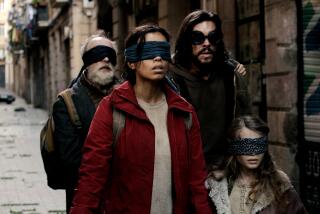The Triple Hyphenate Behind ‘The Icicle Thief’ : Movies: Maurizio Nichetti was outraged at how Italian TV chopped up his films. Now the actor-writer-director is getting his revenge.
- Share via
The frustrating experience of watching his films being interrupted every 12 minutes on commercial Italian TV provided the impetus for writer-director-actor Maurizio Nichetti to make his latest film, “The Icicle Thief.” It was his chance to get even, so to speak.
When, in the movie, a mysterious power outage mixes up the worlds of the film with that of the commercials, Nichetti, playing himself as the director, magically gets into the scene, desperate to get his story back on the right track.
“I’m not against TV, but cinema on TV is not cinema--it’s television! It’s not the same size image or even color as in a theater, and it’s impossible to see it with the same concentration. There are always distractions--light, children, newspapers. With a remote control, the viewer becomes the author of the film. But this is my show! I am the author of my film! When people on the street recognize me and tell me they’ve seen me in one of my films on TV I always say, ‘Stop! What have you seen: the beginning or the end?’ It’s possible to see everything on TV, and it’s also possible to see nothing.
“I wanted to make a film to show the difference between seeing a film on TV and in a theater, a film that showed the problem with irony, not aggression. I didn’t want to make a parody of commercials or of De Sica’s ‘Bicycle Thief’ either. I wanted to show people what their real situation is, to sit up and take notice. And I wanted to show how Italy had changed in the past 40 years.
“I was born in 1948, the year ‘The Bicycle Thief’ was made. There were almost no cars in the streets then, and this was not so long ago. We shot in the center of Milano, and people didn’t recognize their own streets without cars. It’s incredible!: It’s the cars they see and then the town behind them. The car is the important thing. This is terrible, no? One thing that doesn’t change is eating. The family in ‘The Icicle Thief’ is always eating, and so is the family watching it on TV.
“For children, news on TV is really a fiction. On television fiction and reality happen in the same place, and that’s confusing. Everything Marshall McLuhan said about television has all come true. The cinema must become more unreal to compete with TV--more sex, more violence, more fantasy. Perhaps it’s the same for painting in relation to photography.”
Nichetti, who meticulously storyboarded “The Icicle Thief,” brings to films a fertile background in mime, a long collaboration with renowned animator Bruno Bozzeto and in directing commercials. He sees a connection between mime and cartoons and points out that the same gags that worked for the Golden Age silent comedians also works for Tom and Jerry cartoons. (Indeed, Nichetti has just completed his fifth feature, “The Will to Fly,” which he had hoped to do for Disney. He describes it as a love story in which the hero, when he falls in love, gradually becomes like an animated figure from a cartoon.)
He sees his career as a natural progression, and loves film as “the only medium that can use the visual completely.” Indeed, Nichetti’s first film, “Rataplan” (1979), was a silent comedy in the manner of Keaton and Lloyd and told of the misadventures of a Milanese waiter, played by Nichetti himself.
Recently, a law was passed in Italy limiting the number of commercial interruptions in a film when it is aired on TV, but it will not take effect for three years. If Nichetti takes a certain mischievous pleasure in admitting that “The Icicle Thief” was financed by television, he also looks forward to seeing the film on TV--it is due to be aired in February.
“The false commercials I made for the film are deliberately spaced to every 12 minutes. This means that real commercials will be inserted between the fake commercials. I wonder if the viewers will be able to tell them apart!”
More to Read
Only good movies
Get the Indie Focus newsletter, Mark Olsen's weekly guide to the world of cinema.
You may occasionally receive promotional content from the Los Angeles Times.







